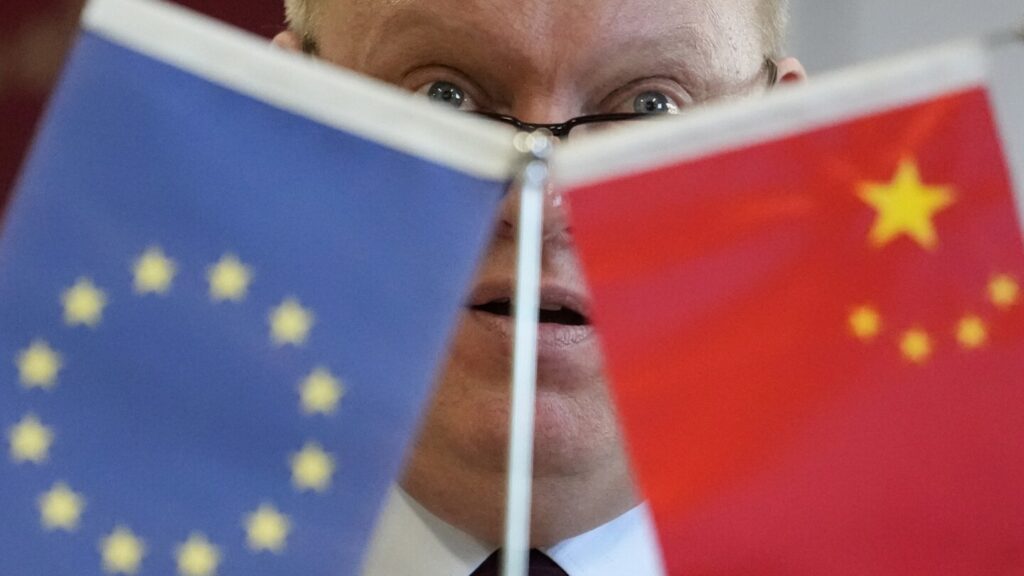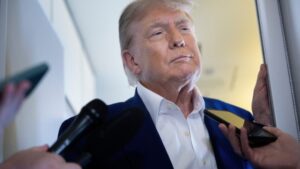
BARCELONA, Spain (AP) — The European Union finds itself at a crossroads, grappling with the repercussions of strained relations with the United States under the Trump administration. Amid threats of tariffs and geopolitical maneuvers, European leaders are contemplating a strategic pivot towards China, a move that could redefine global alliances.
The Trump administration’s aggressive policies, including threats against Greenland and a courtship of Moscow, have led some European leaders to reconsider their reliance on the U.S. This shift has not gone unnoticed by China, which sees an opportunity to strengthen its ties with Europe. As the EU faces a prolonged trade war with Washington, Beijing is positioning itself as a potential partner to mitigate the impact of U.S. tariffs.
Europe’s Economic Ties with China
The economic relationship between the EU and China is substantial, with bilateral trade estimated at 2.3 billion euros ($2.7 billion) per day. China ranks as the EU’s second-largest trading partner in goods, following the United States. Both parties recognize the importance of maintaining stable trade relations for the sake of the global economy, and they share common goals concerning climate change.
However, Europe faces challenges, including a significant trade deficit with China, which reached around 300 billion euros last year. The EU depends heavily on China for critical minerals essential for manufacturing, while European companies are experiencing declining profitability in the Chinese market. Brussels hopes that Beijing will honor recent commitments to ease restrictions on foreign business ventures.
“While others opened their market, China focused on undercutting intellectual property protections and providing massive subsidies to dominate global manufacturing and supply chains,” said EU Commission President Ursula von der Leyen at the G7 meeting in Canada. “This is not market competition – it is distortion with intent.”
Beijing’s Strategic Moves
China is keen to ensure that the EU remains an accessible market for its goods, especially those affected by U.S. tariffs. Analysts predict that the upcoming summit in China, marking 50 years of EU-China relations, may not result in a grand bargain but could lead to significant shifts. China may push for the EU to lift tariffs on Chinese electric vehicles or revisit the Comprehensive Agreement on Investment.
Noah Barkin, an analyst of Europe-China relations at the German Marshall Fund, suggests that the summit itself will send a powerful message. For the EU, a meeting between von der Leyen and Chinese President Xi Jinping would be a primary goal, showcasing unity despite previous diplomatic tensions.
“For Europe, shaping its China policy based on its own interests, rather than simply taking sides, is crucial,” said Sun Chenghao, head of the U.S.-EU program at Tsinghua University’s Center for International Security and Strategy.
Challenges in EU-China Relations
Despite potential benefits, the EU’s relationship with China is fraught with challenges. Concerns over China’s human rights record, espionage, and trade policies persist. Recent arrests of Huawei employees in Brussels and allegations of Chinese-directed cyberattacks highlight ongoing tensions.
Russia’s invasion of Ukraine has further complicated matters, with Europe viewing China as complicit in supporting Russia. This perception has led to the cancellation of high-level dialogues and restrictions on Chinese participation in EU procurement.
U.S. Warnings and Future Prospects
As Europe considers closer ties with China, the U.S. has issued warnings. Treasury Secretary Scott Bessent cautioned against aligning too closely with China, suggesting it could lead to economic repercussions. Analysts argue that a united front with Japan and the EU would strengthen the U.S. position against China.
“If we could just get Japan and the EU and the U.S. together on any issue, we could outweigh the Chinese at the negotiating table,” said Nick Burns, the U.S. ambassador to China during the Biden administration.
Joerg Wuttke, former president of the EU Chamber of Commerce in China, emphasized that the fundamentals of EU-China relations remain unchanged as long as China does not genuinely open its market. He noted that the EU is still closely aligned with the U.S., despite current tensions.
As the EU navigates its complex relationship with China, the outcome of the upcoming summit will be closely watched. The decisions made could have lasting implications for global trade and geopolitical dynamics, potentially reshaping alliances for years to come.





